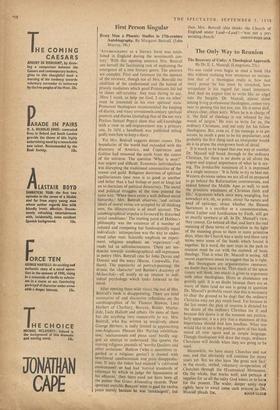The Only Way to Reunion
The Recovery of Unity: A Theological Approach. By Dr. E. L. Mascall. (Longmans, 25s.) No one could even begin to read a book like this without realising how strenuous an occupa- tion that of a theologian really is, how taut every power he has must be stretched, how scrupulous is his regard for exact statement. And then we expect him to write like an angel into the bargain. Dr. Mascall, almost alone among living professional theologians, comes very near to passing this last test, too. He is never dull, always clear, often witty. When he is in charge of it, 'the field of theology is not infested by the weeds of jargon.' He tries to write for us, the ordinary Christians, and, not only for his fellow theologians. But, even so, if his message is to get across, he needs a poet to be his populariser, and probably the first thing such an interpreter would do is to prune the overgrown bush of detail.
It is much to be hoped that one way or another Dr. Mascall will break through to the ordinary Christian, for there is no doubt at all about the urgent and topical importance of what he is say- ing. The irreducible minimum of it is expressed in a single sentence: 'It is futile to try to heal our Western divisions unless we are all of us prepared to go behind the Reformation controversies, and indeed behind the Middle Ages as well, to seek the primitive wholeness of Christian faith and life.' Arguments which once were wrangling, but nowadays are, oh, so polite, about the nature and need of episcopy, about whether the Blessed Sacrament is a sacrifice or a commemoration, about Luther and Justification by Faith, still get us exactly nowhere at all. In Dr. Mascall's view, they cannot. Go behind all that, and learn the real meaning of these terms of separation in the light of the meaning given to them in more primitive days, when the Church was a unity and these very terms were some of the bands which bound it together. In a word, the next steps in the path to reunion must be cut with the mattock of basic theology. That is what Dr. Mascall is saying. All recent experience seems to suggest that he is right.
But theologians are argumentative creatures; no doubt they have to be. Thus much of the space (many will think, too much) is given to arguments with other theologians. Hairs in abundance are prettily split. It is no doubt because there are so many of them (and no one is going to question Dr. Mascall's probable retort that this is necessary to clear the ground to be dug) that the ordinary Christian may not pay much heed. Yet because in the last resort the pace of reunion is dictated by the desire of the ordinary Christian for it and because this desire is at the moment not particu- larly apparent, it is a pity that a statement of this importance should find him heedless. What one would like to see is the positive parts of this book stated all over again and in simple language. Though theologians will draw the maps, ordinary Christians will decide when they are going to be used.
Meanwhile, we have many Churches and not one, and that obviously will continue for many years yet. But we also have 'the great new fact' in the steady, settled, voluntary co-operation of Churches, through the (Ecumenical Movement. On the whole, that works well; and perhaps it supplies for us all the unity God wants us to hay* for the present. The wider, deeper unity may rightly have to await some such process as Dr.


































 Previous page
Previous page